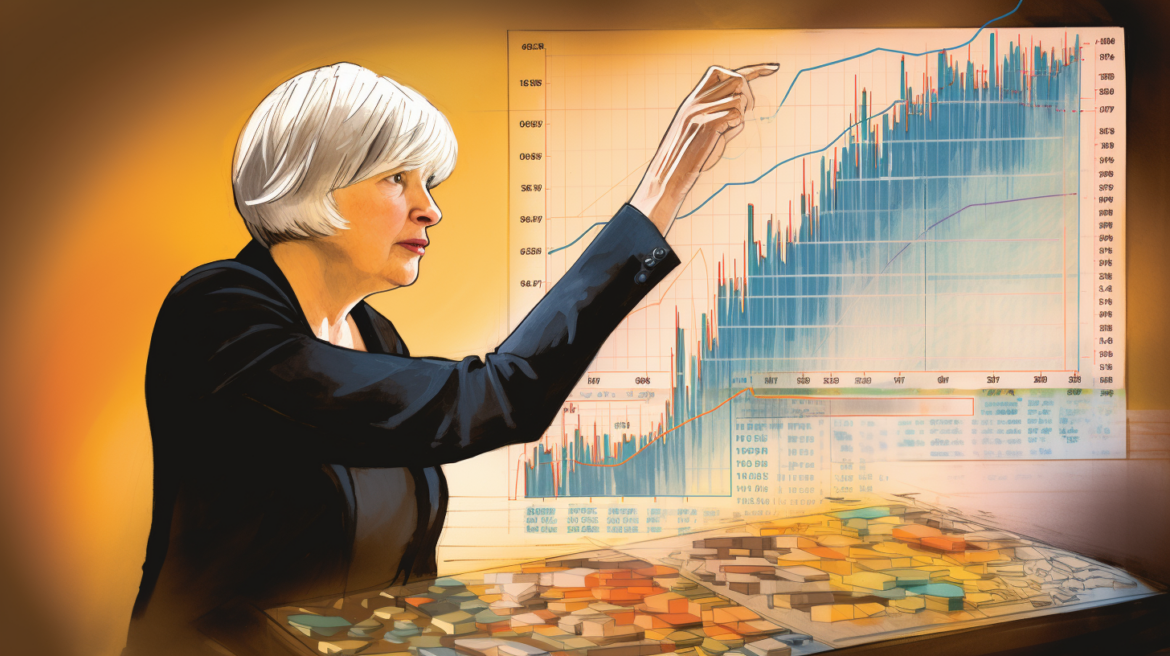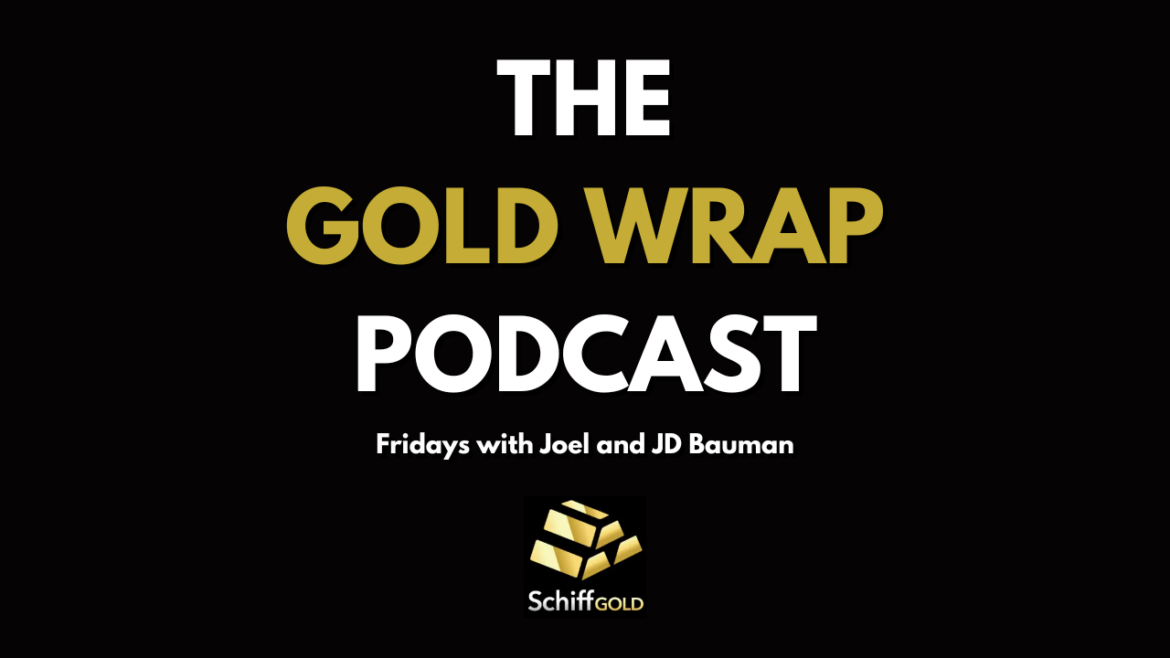Precious metals are apparently waking up. And here is where you can find the best deals.
Site:
Precious metals news
Anyone who has been to a restaurant, a grocery store, or the car lot during the Biden administration can’t deny the reality of inflation. But despite what the federal government is saying about the success of its anti-inflation efforts red flags for inflation keep popping up in the strangest places.
 Fed's Inflation Blunder Sets Stage for Looming US Recession, Says Top Economist
Fed's Inflation Blunder Sets Stage for Looming US Recession, Says Top EconomistJan 23, 2024 - 12:56:29 PST
Brevan Howard's chief economist warns that the Federal Reserve's significant misjudgment of inflation levels has steered the United States towards an inevitable recession in 2024. The central bank's aggressive monetary policy, marked by the sharpest interest rate hikes in forty years - from near-zero in March 2022 to between 5.25% and 5.5% by July 2023 - is exerting considerable downward pressure on the economy. This tightening of monetary policy, described as one of the most stringent on the brink of a recession, has been a critical factor in the economic downturn. The labor market shows significant signs of strain, with hiring nearly at a standstill and a notable drop in the number of people moving from the labor force into jobs.
Jan 23, 2024 - 12:16:28 PST
Morgan Stanley has issued a report, "Digital (De)Dollarization?", shedding light on the potential shift in the currency landscape due to digital assets. Authored by Andrew Peel, the bank's executive director and head of Digital Asset Markets, the report highlights the increasing scrutiny of the US dollar's dominance amidst geopolitical changes and the growing US twin deficits. Peel points out that the rise of digital assets like bitcoin, the expansion of stablecoin volumes, and the emergence of central bank digital currencies (CBDCs) could significantly impact the global currency dynamics. He notes that recent US monetary policies and the strategic use of economic sanctions are prompting some nations to seek alternatives to the dollar.
 U.S. National Debt Soars to Dizzying Heights, Joining Global Debt Pile-Up
U.S. National Debt Soars to Dizzying Heights, Joining Global Debt Pile-UpJan 23, 2024 - 12:13:47 PST
The United States, the world's wealthiest nation, has seen its public debt skyrocket to a staggering $34 trillion, setting a new record even when adjusted for inflation. This alarming increase in debt levels is a trend mirrored in many major economies globally. The situation raises critical concerns about the long-term financial sustainability of key entitlement programs like Medicare and Social Security in the U.S., with debates intensifying in Washington. An impending battle over the debt ceiling is on the horizon, with the current agreement set to expire in January 2025. The U.S. debt-to-GDP ratio has climbed to a concerning 123%, according to the International Monetary Fund (IMF).
 Bill Gross Urges Federal Reserve to Halt Tightening and Slash Rates to Avert Recession
Bill Gross Urges Federal Reserve to Halt Tightening and Slash Rates to Avert RecessionJan 23, 2024 - 07:16:18 PST
Bill Gross, the renowned co-founder and former chief investment officer of Pacific Investment Management Co., has advised the Federal Reserve to immediately cease its balance sheet reduction and start cutting interest rates within the next six to 12 months. Speaking on Bloomberg Television, Gross criticized the Fed's current approach of quantitative tightening as inappropriate under the present economic conditions. He strongly believes that changing this policy and lowering interest rates soon is crucial to prevent a looming recession.
 Golden Surge on the Horizon: UBS Predicts a 10% Leap Amid Rate Cut Speculations
Golden Surge on the Horizon: UBS Predicts a 10% Leap Amid Rate Cut SpeculationsJan 23, 2024 - 07:05:30 PST
UBS strategists forecast a potential 10% increase in gold prices by the end of the year, driven by anticipated interest rate cuts, despite initial declines in early 2024. In a recent note, UBS referred to the current price fluctuations as minor compared to gold's 15% rise in 2023, emphasizing the significant impact of the Federal Reserve's policy changes. They predict gold may reach $2,250 per ounce by year-end, maintaining its position above the crucial $2,000 mark. Contrasting UBS's optimism, Scotiabank analysts maintain a cautious stance but have revised their year-end gold forecast upwards to $2,000 per ounce. Gold prices, influenced by factors like geopolitical instability and market uncertainty, often rise as they are seen as a "safe haven" asset. However, market confidence in the Federal Reserve initiating rate cuts as soon as March is waning, with current probabilities around 48%, a decrease from previous higher expectations.
Peter was recently featured on Real America hosted by Dan Ball.It's no secret that the government has been spending more than it collects, and there are indications that the Biden administration is addressing this issue.
 U.S. Mint Ramping Up Silver Eagle Sales As Gold Eagle & Other Official Coins Remain Weak
U.S. Mint Ramping Up Silver Eagle Sales As Gold Eagle & Other Official Coins Remain WeakJanuary 23, 2024
The U.S. Mint has sold nearly 5 million Silver Eagles in the first three weeks of the year compared to only 87,500 oz of Gold Eagles. This is a Big trend change compared to the previous three years, as the Silver-to-Gold Eagle buying ratio has more than doubled...
Mike highlights the economic perplexities surrounding this decision and questions the implications of creating “free currency.”
China's gold market witnessed a notable surge in 2023 despite the country's economic recovery facing challenges and consumer spending remaining cautious. The Shanghai Gold Benchmark Price PM saw a significant 17% increase. Gold withdrawals from the Shanghai Gold Exchange rose to 1,687 tons, a 7% year-over-year increase. Impressively, Chinese gold ETFs attracted an additional RMB 5 billion (around US$654 million), pushing their total assets under management to a record RMB 29 billion (US$4 billion), with holdings increasing by 10 tons to 62 tons. The People’s Bank of China (PBoC) consistently purchased gold throughout the year, increasing their reserves by 225 tons to a total of 2,235 tons. This robust demand, coupled with stable production and a drop in imports late in the year, led to unprecedented local gold price premiums.
The president touted a manufacturing renaissance. However, economic indices show US manufacturing entering a Dark Age. Home sales are not looking bright, either.
 Crucial Week Ahead: Key Reports to Influence Fed's Rate Policy Decisions
Crucial Week Ahead: Key Reports to Influence Fed's Rate Policy DecisionsJan 22, 2024 - 08:24:04 PST
This week, two significant economic reports are poised to shape the Federal Reserve's approach to interest rate policy, amid growing market skepticism about imminent rate cuts. Firstly, the Commerce Department's initial estimate of the fourth-quarter GDP for 2023 is set to be released on Thursday. Experts predict a modest 1.7% growth, marking the slowest pace since the 0.6% decline in Q2 of 2022. This data will provide a comprehensive overview of the U.S. economic growth in the final quarter of 2023. Following this, the Commerce Department will unveil the December reading of the personal consumption expenditures (PCE) price index on Friday. This index, a crucial measure for the Fed, is anticipated to show a 0.2% increase for the month and a 3% rise for the year, excluding the volatile food and energy sectors. These reports will be key in determining the Fed's future monetary policy direction and are likely to significantly impact market reactions.
A recent study by the Groundwork Collaborative highlights a striking trend in the current economic landscape: over half of the inflation surge in the past year is attributed to 'greedflation,' a phenomenon where corporations leverage excessive profit-taking. Despite a decrease in the overall pace of consumer inflation, it has settled around 3%, with recent months seeing unexpected rises. This trend persists even as prices for wholesalers show stability or decline, indicating that the inflationary pressures are not entirely driven by market fundamentals. The study's findings emphasize that corporate profits are at record highs, suggesting a link between these profits and the sustained inflation rates.
According to the EIA, total World Petroleum Supply reached a record high in September 2023, surpassing the previous peak in November 2018. However, there's a CATCH. While the total world petroleum liquid supply hit a new high, crude oil production is down considerably...
In the last few decades, there has been a global shift towards a "cashless world," a trend that continues to shape financial autonomy. Physical currency is becoming increasingly rare as the majority of the world's money supply exists in electronic form. Governments and financial institutions are actively promoting a cashless society, raising concerns about individual financial freedom.
In the realm of institutional asset management, the copper/gold ratio (blue line) has served as a key indicator for some, providing insights into the potential trajectory of 10-year Treasury yields (red line).
The real estate market witnessed a significant downturn in December, with sales of previously owned homes dropping 1% from November to 3.78 million units, adjusted seasonally and annualized. This decline marks a 6.2% decrease compared to December 2022, reaching the lowest point since August 2010. The year 2023 closed with only 4.09 million units sold, the weakest performance since 1995. Regionally, sales remained flat in the Northeast but fell in other areas, with a 4.3% decrease in the Midwest, a 2.8% drop in the South, and though the West saw a 7.8% increase. These numbers reflect home closings from contracts likely signed in late October and November, a period when mortgage rates were considerably higher, peaking at around 8% in October before dropping to the 7% range in November. The current rate stands at 6.89%, as per Mortgage News Daily.
Gold futures have had a rocky start in 2024, dropping over 2.5% by January 18 to their lowest levels since early December. This decline is partly due to market adjustments in predictions of when the Federal Reserve might reduce interest rates, leading to higher bond yields and a stronger dollar, both of which are challenging the demand for precious metals. Even escalating geopolitical tensions have not been able to boost gold prices.
A startling disconnect as we edge closer to the 2024 general election: On one hand, so-called “experts” parade optimistic economic reports, but for the average American, the story is starkly different. In heated debates, economists squabble over whether the public is hoodwinking pollsters or if mysterious forces are at play. Our guest columnist reveals a shocking truth: our government is playing a smoke-and mirrors-game with the economy. It's subtler than making up numbers. They’re pumping up GDP and job figures through hefty spending and hiring. Unlike the struggling private sector, the government can spend tax dollars and create deficit-financed jobs without having to prove their worth:
In this week's Friday Gold Wrap Podcast, JD and Joel discuss why gold is up today, "doom spending," and other market and precious metals news.










